新概念英语2第一课
新概念英语2-Lesson1ppt课件
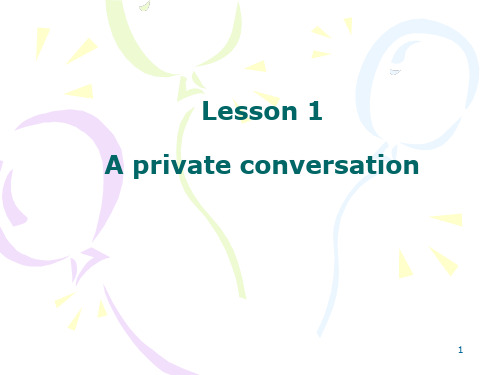
Last week, I went to the theatre. • 去看戏
• 注意拼写规则: • theatre (Br)= theater (US) • centre = center • metre = meter
45
Last week I went to the theatre. 译: 上星期我去看戏。
• 她生於1954年.
• He was born in Germany.
• 他出生在德国。
30
• 忍受的几种说法:bear, stand, endure, put up with
• bear->stand->endure 忍受的极 限在扩大 put up with 口语表达(informal)
31
• Why did the writer complain to the people behind him?
10
重点词汇详解与扩展
联想记忆,词汇倍增
11
New words:
1.private
adj.私的,私人的,个人的
2.conversation n.会话,谈话;会谈
3.theatre 4.loudly 5.angry
• 报纸的报道往往不尊重私人权利.
18
☆conversation n.谈话
19
• 1、talk 内容可正式可不正式, 也可以私人
• Let’s have a talk. • 2、conversation 一般用于正式文体中, 内容上往往
不正式: They are having a conversation.
• a danger to public health • 对公众健康的威胁
新概念英语2第一课

★Business n. 事 Business man :生意人 生意人 do Business: 做生意 go to some place on Business: 因公出差 I went to Tianjin on Business. thing可以指事情 也可以指东西 可以指事情,也可以指东西 可以指事情 It's my business 私人事情 It's none of your business. 无礼地, ★rudely adv. 无礼地,粗鲁地 rude adj.
★private adj.私人的 (personal) A private conversation 私人谈话 A private company 私有公司 A private life 私生活 A private school 私立学校 It‘s my private letter/house. (反)public:公众的,公开的 public letter 公开信 public place :公共场所 privacy:隐私 It‘s a privacy. 《Saving Private Ryan》 private soldier: 大兵 private citizen 普通公民
I had a very good seat.
I had a very good seat =I was sitting in a good place; maybe I was sitting in the front of the theatre.
The play was very interesting .
In the end, I could not bear it.
In the end 最后 as a result ; at last ; eventually ; finally in the end ; as a result 强调结果 at last ; eventually 强调经历艰难过程之 后最终。。。 eg. We have arrived at last. finally 强调次序
新概念英语2第一课
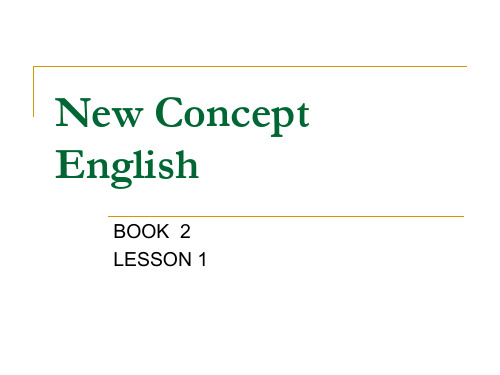
attention n. 注意
Attention ,please. 请注意(口语) pay attention 注意 pay attention to … 对……注意 You must pay attention to that girl.
pay a little attention 稍加注意 pay much attention 多加注意 pay more attention 更多注意 pay no attention 不用注意 pay close attention 特别注意
theatre n.剧场, 戏剧
(1) 去看戏:go to the theatre (2) cinema n.电影院 seat n.座位 take a seat/take your seat 坐下来 sit down 坐下;be seated=take a seat 就坐
Sit ห้องสมุดไป่ตู้ seat作为动词的区别
angry adj. 生气的 副词形式:angrily adv. 生气地 be angry with sb./at/about sth be cross with sb. /about sth
生气的程度
程 I was annoyed. 度 I was angry/cross. 加 I was very angry. 深 be blue in the face : I am blue in the face.(脸色都青了, 相当生气了)
11. The writer could not bear it . He could not ___ it. a. carry b. suffer c. stand d. lift 12. The young man spoke rudely. He wasn‟t very ___. a. clever b. rude c. polite d. kind
新概念英语第二册第1课

1、Last week I went to the theatre.
• 动词go的原义是离开一个地方去另一个地方,与介 词to连用后,常加上主语所要去的目的来代表主语 的动作目的。 • go to the +地点 表示去某地干嘛 • go to the theatre = go to the theatre to see a play去剧 场看戏 • go to the cinema =see a film 去电影院看电影 • go to the dairy 去牛奶店 • go to the + 人 + 's 表示去这个人开的店 • go to the doctor's 去看病;go to the butcher's 买肉
Lesson 1
A Private Conversation
Last week I went to the theatre. I had a very good seat. The play was very interesting. I did not enjoy it. A young man and a young woman were sitting behind me.They were talking loudly. I got very angry. I could not hear the actors. I turned round. I looked at the man and the woman angrily. They did not pay any
★business n. 事, 生意
• • • • • • • • ① n. 生意 business man :生意人 do business: 做生意 go to some place on business:因公出差 I went to Tianjin on business. ② n. 某人自己的私人的事情 It's my business. (指私人的事, 自己处理的事) It's none of your business. 不关你的事。
新概念英语第二册 第一课(共22张PPT)

12. It’s none of your business. 关你屁事;这不关你的事。
class.上课期间你要专心听老师讲课。 15. ___I_n__th__e__e_n_d____they reached a place of safety.
他们终于到达了一个安全的地方。
16. Peter and Tom made up __in___th__e__e_n_d____.
彼特和汤姆最后和解了。 17. The shelf, too weak to ___b__e_a_r___all the books,
14. private ['praɪvət] adj. 私人的;个人的;私下的;私有的
The president is paying a private visit to Europe. 总统正在欧洲进行私人访问。 We each have our private views about it. 我们每个人对这件事都有自己的看法。
关你屁事;这不关你的事。 13. __r_u_d__e_l_y_ adv. 无礼地;粗暴地 14. __p__ri_v_a_t_e__ly___ adj. 私人的;个人的;
私下的;私有的 15. __c_o__n_v_e_r_s_a__ti_o_n_ n. 谈话;会话
Step 2 在语境中加深对词汇短语的理解与记忆,掌握其具体用法。 1. theatre [ˈθiːətər] n. 电影院,戏院;戏剧
新概念2册第一课讲解ppt课件

经营者提供商品或者服务有欺诈行为 的,应 当按照 消费者 的要求 增加赔 偿其受 到的损 失,增 加赔偿 的金额 为消费 者购买 商品的 价款或 接受服 务的费 用
Questions
• Where did the writer go last week? • Why didn’t he enjoy the play? • What did the young man say to the writer?
e.g. The play was very interesting
e.g. Last week I went to the theatre
• 人称代词/名词 + was/were + doing+其他 e.g. A young man and a young woman were
sitting behind me e.g. They were talking loudly.
经营者提供商品或者服务有欺诈行为 的,应 当按照 消费者 的要求 增加赔 偿其受 到的损 失,增 加赔偿 的金额 为消费 者购买 商品的 价款或 接受服 务的费 用
经营者提供商品或者服务有欺诈行为 的,应 当按照 消费者 的要求 增加赔 偿其受 到的损 失,增 加赔偿 的金额 为消费 者购买 商品的 价款或 接受服 务的费 用
能跟人)
新概念第二册第一课

nothing.
see:看见,强调结果; look:看,动作; watch:长时间关注,尤其是活动的物体 I had dinner and watched TV for several hours. He spent the entire afternoon watching a football match.
★attention n. 注意
pay attention 注意
pay no attention
a little much more close
0% 20% 40% 60% 80% 100%
interest
n.兴趣, 利息 vt.使发生兴趣, 引起...的注意 interesting adj.有趣味的,修饰物 interested adj. .感兴趣的,修饰人 be interested in sth./doing sth.
★bear (bore, born) v. 容忍
How can you bear living in this place? 你怎么能受得了住在这个地方?
Who will bear the cost? 谁来承担这笔费用? put up with
stand
bear
★business n. 事, 生意
public public public public 公共的 school公立学校 letter 公开信; place 公共场所
★conversation n.谈话
have a talk
have a chat have a dialogue
内容可正式可不正式
闲聊 ,侃大山 对话, 可以指正式国 家与国家会谈
enjoy
enjoy sth 享受 enjoy doing 热衷于 enjoy oneself=have a good time 享受生活/阳光 热衷于大声讲英语/读书
新概念英语2第一课
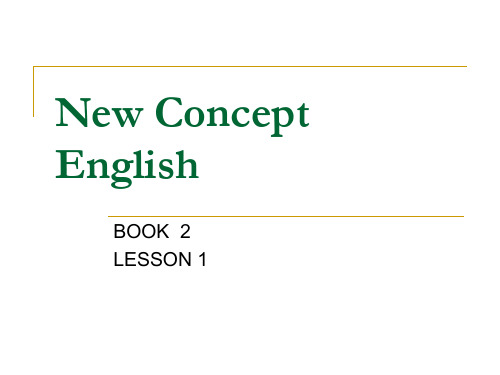
Talk
1. 可作可数名词, 通常指在普通场合 对少数人发表的简短讲话
talk with / to sb. = have a talk with sb Talk with/to sb about sth
She's a terriblen.剧场, 戏剧
(1) 去看戏:go to the theatre (2) cinema n.电影院 seat n.座位 take a seat/take your seat 坐下来 sit down 坐下;be seated=take a seat 就坐
生词和短语 words and expressions
private adj. 私人的 conversation n. 谈话 theatre n. 剧场,戏院 seat n. 座位 play n. 戏 loudly adv. 大声地
angry adj. 生气的 angrily adv. 生气地 attention n. 注意 bear v. 容忍 business n. 事 rudely adv. 无礼地,粗鲁地
pay a little attention 稍加注意 pay much attention 多加注意 pay more attention 更多注意 pay no attention 不用注意 pay close attention 特别注意
pay
(1)vt., vi.支付(价款等): Have you paid the taxi-driver? 你给出租车司机钱了吗?
angry adj. 生气的 副词形式:angrily adv. 生气地
新概念英语第二册-第一课
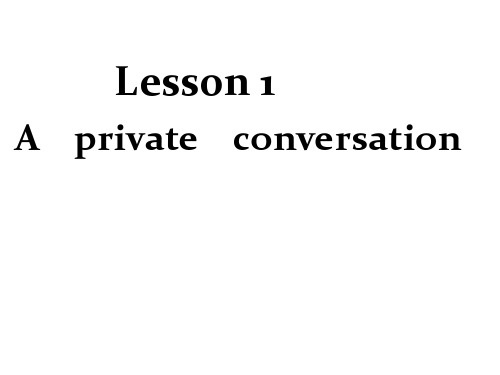
5. _W__a_s_____ (be) it cold in your city
yesterday?
过去进行时
表示在过去某一时刻或某一段时间
内正在进行或发生的动作。
1.构成 : “主语+was/were + 现在分词” 2. 否定形式: “主语+was/were not +现在分词” 3. 疑问句形式: “was/were + 主语+ 现在分词”
He went to the theater. 2. Why did the writer complain
(抱怨)to the people behind
him?
Because they were talking loudly.
Turn to P15 两道选择理解题
讲解课文 P15 句型和词汇选择题
陈述句:陈述一个事实,句末用句 号,分为肯定句和否定句。
简单陈述句:陈述一个事实的简单 句
主语+谓语动词+宾语+ 状语(时间/地点/方式)
时间状语即可以放在句首 也可以放句尾
汉语的语序: 什么人+什么时间+什么地点+怎样做+为什么做+做什么
我爸爸今天早上在家里很认真地为我做了一个汽车模型。
英语的语序: 什么人+做什么+为什么做+怎样做+什么地点+什么时间
My father made a car model for me carefully at home this morning.
做P14 B 句子排序 做P15最下面 句子排序
Grammar: 一般过去时
新概念二第一课(共23张PPT)
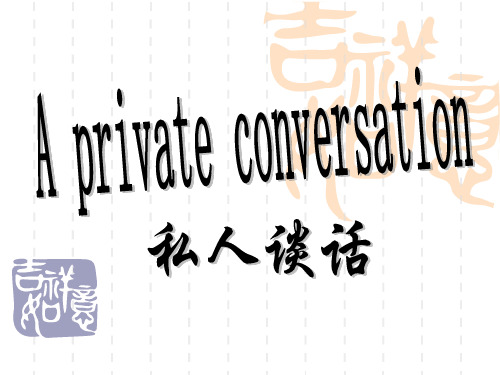
PS:时间状语可以置于开头 例:I read books carefully in
the library yesterday morning. = Yesterday morning, I read
books carefully in the library.
8.My job is repairing cars.(动名词做 表语)
9.The question is what you want to do.(从句做表语,即:表语从句)
二、主语———谓语 在这一句型中,动词为 不及物动词及不及物的动词词组。在有的 句子中,不及物动词可以有状语修饰。
1.The sun is rising. 2.I'll try. 3.Did you sleep well?(well做状语,修饰不
句型分析:
7.They did not pay any attention. 析: pay attention to sth/sb pay no attention to ..没有注意 8.It’s none of your business. 析:固定语法---不关你事!
本课语法—简单陈述句的语序
5.What do you want me to do?(不定式做宾补)
6.We thought him to be an honest man.(to be 做宾补)
7.He believed them to have discussed the problem.(不定式的完成式做宾补)
8.He believed her to be telling the truth.(不定 式的进行式做宾补)
新概念英语二Lesson1课件

口诀:清念/t/, 元浊/d/, /t/ /d/之后念/id/.
②表示过去发生的动作或行为。(实义动词的结构)
肯定句: 主语+ Ved +其它。
翻译:1.昨天她给我打了三次电话。 She telephoned me three times yesterday.
Were they at work last week ? Yes, they were
.
② 昨天下午你在哪儿?
我在家。
? I was at home .
②表示过去发生的动作或行为。(实义动词的结构)
肯定句: 主语+ Ved +其它。 动词过去式的变化规则: 1.一般情况直接+ ed 2.以不发音字母e结尾直接+ d 3.以辅音字母+y结尾的,变 y i +ed 4.辅元辅结尾,该音节重读,双写尾字母+ ed
3. I played computer games yesterday morning.(划线部分提问) When did you play computer games?
4. I played computer games yesterday morning.(划线部分提问) What did you do yesterday morning?
一般疑问:Was/Were+主语 +其它? (1.Was/Were提前大写; 2. 第一人称 → 第二人称 3. some → any)
特殊疑问:找词变句
5.请根据提示填空。
①Yes, I was at the greengrocer’s on Thursday.(根据本句提问)
新概念英语第二册第一课 详细版
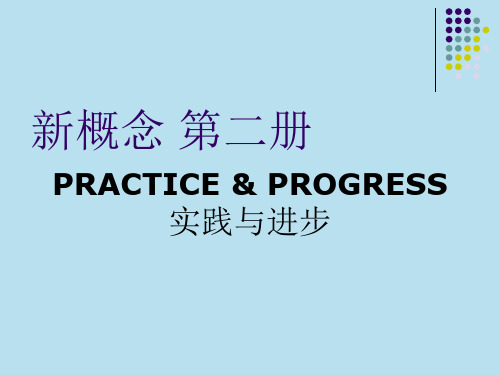
bear hug热情的拥抱
11. business ① n. 生意
business man 生意人
do business 做生意
go to some places on business因公出差
②n.某人自己的私人事情
6. He had a good seat. He was sitting in a good( ).
A. chair b. place c. armchair d. class 7. He was a young man. He wasn’t very ( ) A. old b. big c. tall. d. large 8. The writer looked at the man and the woman
looked at ( )angrily. A. them b. they c. their d. us 5. The young man and the young woman paid ( )
attention to the writer. A. none b. any c. not any d. no
the children, quietly 5.quietly, the door, he, opened 6. immediately, left, he
7. a tree, in the corner of the garden, he, planted
8. before lunch, the letter, in his office, quickly, he, read,
behind the times 落伍, 赶不上潮流 eg. I am sorry to say, my dear, your clothes are a bit behind the
新概念第二册Lesson 1 A private conversation (自带高清视频+听力)

8. attention n. 注意
翻译:大家请注意!下课了! __A__t_t_e_n_t_i_o_n__, _p_l_e_a_s_e__!___ Class is over now!
词组: _p__a_y__a_t_t_e_n_t_i_o_n__t_o____ 注意…… 翻译:Please pay attention to this point, because I will test you on this. _注___意__这__一__点_____
口语:(It’s) none of your business = _I_t_’s__n_o__n_e__o_f__p_i_g_e__o_n_.__ 不关你的事。
Grammar 英语基本句型
以下哪些是句子呢?
1. 美丽的风景 2. 马跑 3. 红鲤鱼与绿鲤鱼与驴 4. 他说 5. 我吃饭
I ate an apple.
11. rudely adv. 无力地,粗鲁地
派生:_________r_u_d__e________ adj. 粗鲁的 词组:____b_e__r_u_d__e__t_o__s_b_.___ 对某人粗鲁
Reading comprehension
1. Why couldn’t I hear the actors? Because the young man and woman __w_e__r_e__ta__lk_i_n_g__l_o__u_d_l_y_____.
主谓 宾
I ate a green apple quickly.
定
状
I am Mary.
主系 表
ቤተ መጻሕፍቲ ባይዱ
新概念二第一课(共22张PPT)

go to the theatre: 去看戏
① go to the +地点:去某地干嘛
Eg:go to the hospital (不是去看病,可以是去看病人)
['biznis]
n.事
12 rudely ,粗鲁地
['ru:dli]
ad.无礼地
Private
① adj. 私人的; 反义词:public (公共的) public school 公立学校
private school 私立学校 privacy n. 隐私 It’s my privacy.
本课的语法点是:简单陈述句的语序 语序(when)+主语+ 谓语+ 宾语+how+where+when
如果时间和地点连在一起:
先放地点再放时间,即where+ when
Eg: He went to the theatre last night.
如果问何时何地,是一个固定搭配: when and where
4 seat
[si:t]
n.座位
5 play
[plei]
n.戏
6 loudly
['laudli]
ad.大声地
7 angry
['æ ŋgri]
a.生气的
8 angrily
['æ ŋgrili]
ad.生气地
9 attention
新概念英语第二册 第1课 (共19张PPT)

get 是逐渐变得的意思,接近become e.g. During the night, it got terribly cold.
4. I couldn’t hear the actor.
hear sb. 听见某人说话 hear from sb. 收到某人来信 hear of sb./sth. 知道某人(某事) hear about sth. 听说、得悉某消息 e.g. I can’t hear you.
summary writing.
1、where did the writer go last week? 2、did he enjoy the play or not? 3、who was sitting behind him? 4、were they talking loudly ,or they talking quietly ? 5、could the writer hear the actors or not? 6、did he turn around or not? 7、what did he say? 8、did the young man say ,“the play is not interesting”or did he say ,“this is a private conversation”?
New words
private
adj.私人的 personal. a private company; private life
conversation
n.谈话 talk have a conversation with sb. e.g. I had a quiet conversation with my closest friend. v. converse交谈
新概念英语第二册 第一课 Lesson01 a private conversation
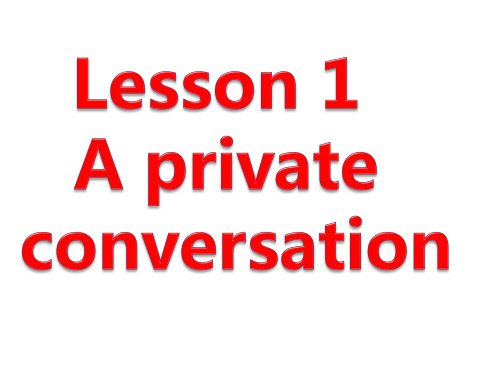
a bear hug 热烈的拥抱 bear 熊
★ business n. 事, 生意
① n. 生意 business man : 生意人 do business: 做生意 on business: 因公出差
② n. 某人自己的私人的事情 It's my business. (指私人的事, 自己处理) It‘s none of your business. 不关你的事。 Mind your own business. 管好自己的事 情。
• seat n.座位 Please take/have
a seat. 请坐下.
Is the seat taken? 这座位有人坐吗?
打篮球 弹钢琴
play n. 戏 看戏 see a play
play v. 打(球),弹奏
play basketball
play the piano
loudly adv. 大声地 现在他们正在大声讲话。
3. The play was very interesting.
interesting adj.
• ---ing 令人… 的 • ---ed 自己感到… 的 • This book is interesting. 书有趣 • be interested in… 对……感兴趣
interest n. 兴趣 have interest in… 对…感兴趣
Words of lesson 1
public theatre
private
conversation
play
angry
angrily
seat
attention
bபைடு நூலகம்siness
stand
新概念英语第二册第一课

Last week I went to the theatre. I had a very good seat. The play was very interesting. I did not enjoy it. A young man and a young woman were sitting behind me. They were talking loudly. I got very angry. I could not hear the actors. I turned round. I looked at the man and the woman angrily. They did not pay any attention. In the end, I could not bear it. I turned round again. 'I can't hear a word!' I said angrily. 'It's none of your business,' the young man said rudely. 'This is a private conversation!'.
3. The play was very interesting. I did not enjoy it.戏很有意思,但我却无法欣赏。
interesting adj .引起兴趣的,有趣的(修饰物)
Eg : This man is very interesting. The book is so interesting that I do not want to put it down.
New
新概念英语第二册第一课(包含课文、练习及答案)
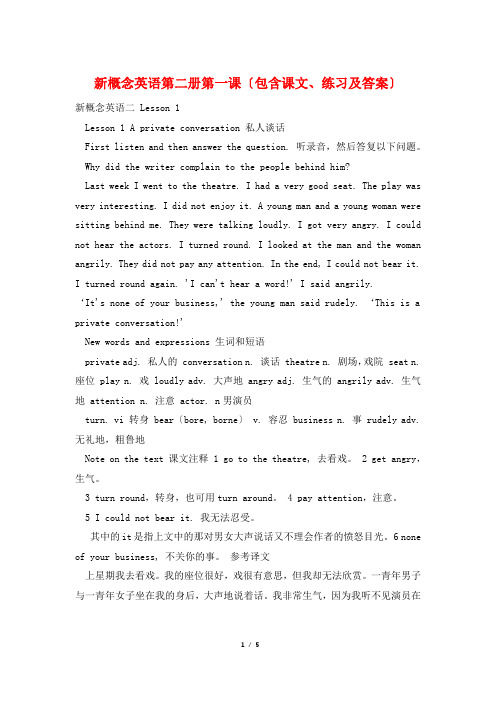
新概念英语第二册第一课〔包含课文、练习及答案〕新概念英语二 Lesson 1Lesson 1 A private conversation 私人谈话First listen and then answer the question. 听录音,然后答复以下问题。
Why did the writer complain to the people behind him?Last week I went to the theatre. I had a very good seat. The play was very interesting. I did not enjoy it. A young man and a young woman were sitting behind me. They were talking loudly. I got very angry. I could not hear the actors. I turned round. I looked at the man and the woman angrily. They did not pay any attention. In the end, I could not bear it.I turned round again. 'I can't hear a word!' I said angrily.‘It's none of your business,' the young man said rudely. ‘This is a private conversation!'New words and expressions 生词和短语private adj. 私人的 conversation n. 谈话 theatre n. 剧场,戏院 seat n. 座位 play n. 戏 loudly adv. 大声地 angry adj. 生气的 angrily adv. 生气地 attention n. 注意 actor. n男演员turn. vi 转身 bear〔bore, borne〕 v. 容忍 business n. 事 rudely adv. 无礼地,粗鲁地Note on the text 课文注释 1 go to the theatre, 去看戏。
新概念英语2第一课PPT

have a conversation with
about
Jackie Chan This is my private aircraft.
I have a private computer. This is a private letter. What about you?
private adj. 私人的
rudely
happily
carefully
peacefully
The dog is very________ (love, lovely)
lovely
A private conversation
I am a teacher.
句子结构:
主谓 He smiled. I walk. I don’t know.
……
主谓宾 I like apples. She listened to the news. I love you.
…
She gave him a pen.
My father bought me a little dog.
01
02
03
04
05
06
Listen to the tape and repeat the sentence.
Finish the text
单击此处添加文本具体内容,简明扼要的阐述您的观点,以便观者准确的理解您传达的思想。
01
Last week I went to the _____ . I had a very_____ . The play was very interesting. I did not_____ it. A young man and a young woman were sitting_____me. They were talking_____. I got very angry. I could not hear the _____. I _________. I looked at the man and the woman_______. They did not pay any________. In the end, I could not______ it. I turned round again. 'I can't hear a word!' I said_____.
- 1、下载文档前请自行甄别文档内容的完整性,平台不提供额外的编辑、内容补充、找答案等附加服务。
- 2、"仅部分预览"的文档,不可在线预览部分如存在完整性等问题,可反馈申请退款(可完整预览的文档不适用该条件!)。
- 3、如文档侵犯您的权益,请联系客服反馈,我们会尽快为您处理(人工客服工作时间:9:00-18:30)。
Answers of the Question:
1、He went to the theatre. 2、No,he didn't.Because he could not hear
the actors.The man and the woman behind him are talking loudly. 3、A man and a woman. 4、They were talking louldly. 5、效猠楡?楜?环渠湯?景礠畯?畢楳敮獳尮
2、conversation n.谈话
converse, 同根动词,表谈话,不及物动词 converse with sb <1>conversation n.谈话 have a conversation with sb I had a quiet conversation with my closest friend.. <2>talk. 可以正式,也可以私人的 conversation. 比较正式一些 let's have a talk They are having a conversation. <3>dialogue :对话 China and Korea are having a dialogue. 正式 <4>chat: 闲聊 chat on QQ <5>gossip: 嚼舌头
NEC2由96个幽默风趣的小故事组成,一课 一篇小文章,每节课我们共同学习一篇文章, 每节课我会分成五个部分: ?一:关键词 ?二:课前准备问题 ?三:课文学习 ?四:课文重点内容讲解 ?五:拓展提高
在我们讲第一课之前,送给大家一句话: Rome is not built in one day. 罗马不是一天建成 。 所以持之以恒是最重要的。
I said angrily.
It s none of your business, the young
参考译文
上个星期我去戏院看戏。我的座位很好,戏很有意 思,但我却无法欣赏。一青年男子与一青年女子坐 在我的身后,大声地说着话。我非常生气,因为我 听不见演员在说什么。我回过头去怒视着那一男一 女,他们却毫不理会。最后,我忍不住了,又一次 回过头去,生气地说:“我一个字也听不见 了!”“不关你的事,”那男的毫不客气地说, “这是私人间的谈话!”
have a + talk/chat/dialogue/conversation/gossip 词
New Concept English II lesson1
Fiona
Hello everyone,I'm Fiona. Welcome to the world
of NCE2 . First, I'd like to introduce this book.
手中这本书,它就是传说中风靡世界的新 概念系列教材,给大家打个比喻吧,它其实 就像一个有着很多格子的书架,格子分类清 晰。每个格子放着不同的语法知识点,而格 子之间又有着很紧密的联系。这样学下来, 对所学的知识异常清晰,需要哪个知识,走 到哪个格子前,就一下子找到了。就像我们 这本NCE2,它有四个单元,每个单元的内 容都在复习前面内容的基础上再补充。
四、Langue Points
1、private adj.作形容词, 1)表“私人的”,通常作定语来修饰名词,相当于 personal. A Private Conversation.表示私人谈话。 a private life/car/letter/school/affairs(私事) New oriental is a private school. 2)表秘密的(secret) a private/secret place 形容词:privacy :隐私 it's a privacy. adj. 反义词:public:公众的,公开的 public school/ letter / place
Ok. Now let's get down to our business.我们 言归正传。
现在开始进行第一课的学习:
Lesson 1 A Private Conversation
私人谈话
一、New words and expressions:
谈话 theatre . 剧场,戏院 seat . 座位 play . 戏 loudly . 大声地 angry . 生气的 angrily . 生气地 attention . 注意 bear . 容忍 business . 事、生意 rudely . 无礼地,粗鲁地
5 What did the young man say?
三:The text
Last week I went to the theatre. I had a very good seat. The play was very interesting. I did not enjoy it. A young man and a young woman were sitting behind me. They were talking loudly. I got very angry. I could not hear the actors. I turned round. I looked at the man and the woman angrily. They did not pay any attention. In the end, I could not bear it. I turned round again. “I can' t hear a word!”
二、Questions:
1 Where did the writer go last week
?
2 Did he enjoy the play or not?why?
3 Who was sitting behind him?
4 Were they talking loudly,or were they talking quietly?
